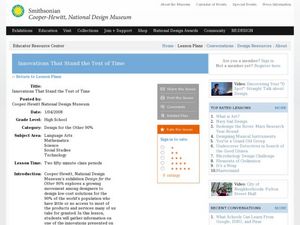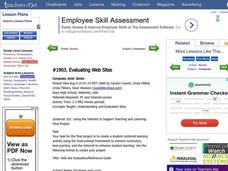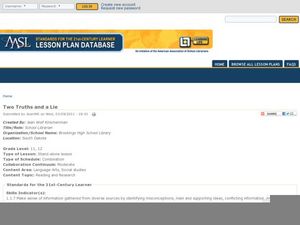Curated OER
Critical Analysis of Arthurian Internet Website
Students use a worksheet to rate the material on different websites. They complete a critical analysis of the site. They demonstrate information they learned during viewing of the different websites.
Curated OER
Introduction to the Scientific Method
Students designs and conduct a scientific experiment that identifies the problem, distinguishes manipulated, responding and controlled variables, collects, analyzes and communicates data, and makes valid inferences and conclusions.
Curated OER
Exploring Weather Websites
Students research and locate their own weather data using a weather website. They examine how to locate valid information on the www.weather.com website, and explore the website. Next, they select a city they want to visit, and compare...
Curated OER
Pair 'Em Up!
Third graders verify the validity of Punnett squares. They simulate a real-world situation by drawing chromosomes from a paper bag and track the data.
Curated OER
Innovations That Stand the Test of Time
Students create a class presentation that explains the value of an innovation to society. In this design innovation lesson, students discuss relationships among math, science, technology, and engineering, read a story about design...
Curated OER
Evaluating Web Sites
Students examine how to evaluate a website. They discuss a graphic organizer, conduct Internet research, and apply a checklist of criteria to various websites.
Curated OER
Is There A Formula for People?
Students explore proportions which are typical of the human body. Given a list of classic proportions from earlier centuries, students work in pairs to test the validity of the proportions. Pupils share their personal measurements. ...
Curated OER
Documenting a Student Exchange program
Seventh graders examine student exchange programs. In this Current Events lesson, 7th graders produce a website for viewers. Students research the life of foreign exchange students.
Curated OER
Sharing Information
Learners collaborate with another classroom via the Internet to share data, questions, results, and check the validity of their testing procedures.
Curated OER
Work-Kinetic Energy Theorem
Students prove the validity of the Work-Kinetic Energy Theorem by analyzing the Car and Driver website which lists qualitative and quantitative data about an assigned car. They decide whether or not they would purchase the car based on...
Curated OER
Who Says?
Students evaluate websites for scientific accuracy and usefulness. They explore various content evaluation criteria and observe a demonstration on evaluating web sites. They select and evaluate a website for its content information on a...
Curated OER
Presidential Election 2004: Analyzing the Attack Ads
High schoolers view and text the text of presidential election advertisements in 2004. Using the ads, they analyze them and check the validity of the statements made. They answer discuss questions for each ad and share them with the...
Curated OER
Battle of New Orleans
Students use the Internet, encyclopedias, and other library resources to discover basic facts about the Battle of New Orleans and the 1768 revolt by French colonists in Spanish Louisiana. They examine two websites that give information...
Curated OER
Gathering Statistics for Research
Learners gather statistics to include in their research. For this statistics lesson, students investigate how to incorporate statistics into research and other readings besides math. They collect data based on other topics, analyze the...
Noyce Foundation
Ducklings
The class gets their mean and median all in a row with an assessment task that uses a population of ducklings to work with data displays and measures of central tendency. Pupils create a frequency chart and calculate the mean and median....
Curated OER
Cartoons for the Classroom: Timely vs. Timeless
In this historical events worksheet, students analyze a political cartoon about bank failure and respond to 2 talking point questions.
Curated OER
Two Truths and a Lie: Internet Research Skills
It's tough for high schoolers to assess what is a credible resource and what is not. A helpful resource prompts class members to research a particular topic and record two facts—and create one lie—while documenting the sources. They...
National Endowment for the Humanities
Who Were the Foremothers of the Women's Suffrage and Equality Movements?
Young scholars complete a unit of lessons on the women who contributed to the early Women's Rights Movement in the U.S. They conduct Internet research, examine images online, develop a list of women, complete a worksheet, and create a...
Alabama Department of Archives and History
The Civil War at Home
To conclude a study of the 4 C's (cause, course, consequences, and characters) of the Civil War, young historians examine personal letters that reveal the effects of the war on those at home.
Curated OER
Information Overload: Looking at News
How do events reported in mainstream newspapers, on television news, blog posts, and social network sites differ? Ask your class to investigate the way the same news item is presented in the many information sources available. Groups...
NOAA
Ground-truthing Satellite Imagery with Drifting Buoy Data
Ground-truthing ... is it even a word? The last installment of a five-part series analyzes how scientists collect sea surface temperature data. Scholars use government websites to compare temperature data collected directly from buoys...
Shodor Education Foundation
Vertical Line Test
Connect the points to create a function. Using points given by the applet, pupils try to connect them to create a line that would pass the vertical line test. The resource keeps track of the number of sets the learner is able to identify...
Utah Education Network (UEN)
8th Grade Poetry: Sonnet Poem
The third lesson of five in an eighth-grade poetry unit has young scholars comparing Shakespearean sonnets with Petrarchan sonnets. To begin, they examine the different structures of the two forms and their different rhyme schemes. After...
Curated OER
Winter Syllables pg. 2
Come December, practice syllable counting with the appropriate time of year! Using the winter theme, readers identify the winter picture, clap the number of syllables, and place the correct number of cotton balls next to the four...























